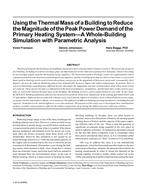The research aimed to design, develop and commissioning a on an existing building. For facility sizing, models are used and developed, the PV-generation modelmainly consists of functions developed by Sandia National Laboratory. The chosen PV-facility exists of 65, 260Wp panels facilitating 16.9kW peak capacityconnected to a 15kW inverter. These polycrystalline modules are panel-level optimized. During 2014 modelled reference year, it produced about 18.000 kWh andcovers 22% of the total yearly electrical energy demand while 19% of the production is exported to the Grid. A Photovoltaic-model provides predictions based on theclimate data, wind speed, global horizontal irradiation and ambient temperature. A solar separation model, for direct and diffuse radiation is validated for hourlyvalues, however monthly cumulative comparison and daily profile show that the 10minute data also provides accurate outcomes. The production is compared with themodel and independently monitored panels, and except for one panel, which produces about 12% less compared to the row average, the system performs well. Thispanel produces a lower DC-current compared to the other in the row, which may be caused by a bad operating PV-cell. It shows that commissioning of PV-panels ismore important than often thought.
Citation: 2018 Annual Conference, Houston, TX, Conference Papers
Product Details
- Published:
- 2018
- Number of Pages:
- 9
- Units of Measure:
- Dual
- File Size:
- 1 file , 1.1 MB
- Product Code(s):
- D-HO-18-C057

